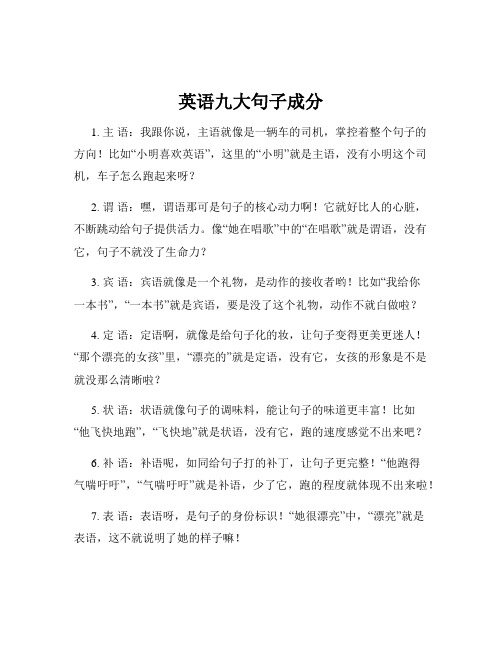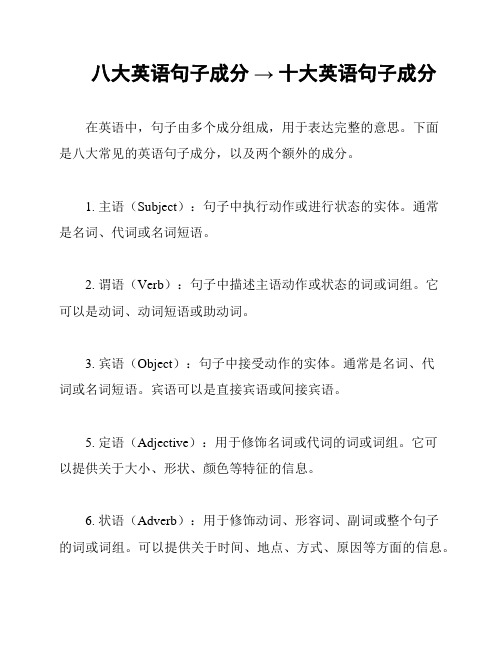英语句子成分(经典)
七大英语句子成分

七大英语句子成分七大英语句子成分包括:主语、谓语、宾语、表语、定语、状语和补语。
1. 主语(Subject):句子中进行动作或被动作用的人、事物或概念。
例如:"She" in "She is reading a book."(她正在读书。
)2. 谓语(Predicate):句子中说明主语动作或状态的部分。
例如:"is reading" in "She is reading a book."(正在读。
)3. 宾语(Object):句子中接受或承受动作影响的人、事物或概念。
例如:"a book" in "She is reading a book."(一本书。
)4. 表语(Predicative):句子中说明主语状态、性质或身份的部分。
例如:"happy" in "She is happy."(快乐。
)5. 定语(Attributive):修饰主语或宾语,并添加更多的描述信息。
例如:"red" in "She is wearing a red dress."(穿着一条红裙子。
)6. 状语(Adverbial):修饰谓语或整个句子,在时间、地点、原因、方式等方面提供更多详细信息。
例如:"yesterday" in "She went to the park yesterday."(昨天。
)7. 补语(Complement):对主语或宾语进行补充说明,通常是形容词、名词、介词短语或不带to的动词不定式。
例如:"a teacher" in "She became a teacher."(成为一名教师。
)。
英语句子成分详解方法精选全文完整版

可编辑修改精选全文完整版英语句子成分一、英语句子的成分组成句子的各个部分叫作句子的成分。
句子成分主要包括主语、谓语、宾语、表语、宾语补足语、定语和状语。
主语和谓语是句子的主体部分。
1)主语subject主语是一个句子的主体,是全句叙述的对象,是句子要说明的人或事物,即表示句子所说的“是什么”或“是谁”,常由名词、代词、动名词或动词不定式等担任,一般位于句首。
The girl can sing many English songs.We are students. / This is my pen. Yours is on the desk.The blind need more help.To speak loudly in public is not polite.Smoking is bad for your health.2)谓语predicate谓语是对主语加以陈述,表示主语的动作或状态,常由动词担任,一般位于主语之后。
谓语有时态和语态的变化,且要和主语在人称和数上保持一致。
I love you. You hate me. You hurt my heart.I have an English-Chinese dictionary. He has one too.We can play the piano.She is talking with her sister. / I have seen this man before.3)宾语object宾语是谓语动词所涉及的对象,是谓语动词所表示动作的对象或承受者。
常由名词、代词、动名词或动词不定式等担任,一般位于谓语动词(及物动词)或介词之后。
He is doing his homework. / I saw a plane in the sky just now.They did nothing this morning. / I met him on my way home.She wants to go home.We enjoy playing football.【注意】:某些及物动词之后要求有双宾语,即直接宾语和间接宾语,直接宾语指物,间接宾语指人。
英语语法中的9种句子成分

英语语法中的9种句子成分一.主语Subject“主语”中的“主”是主人、主导的意思。
(一)定义:主语是动作的发出者,通常为一个句子中第一个独立的名词【或名词性结构】。
也可以理解为主语就是句子中说明的人或事物【sb/sth】独立的:即不在短语中、不在从句中(二)句子中主句的4种形式:1.名词本身2.代词3.动词-ing/to do形式【注意:做状语的V-ing/to do 结构除外】4.主语从句【即主语是个句子,引导词that 不可省略】例句:The flower is beautiful.I love you.Teaching English is my job.To teach English today is my job.(补充:动词做主语的-ing形式称为动名词,to do形式称为不定式。
前者强调经常性、习惯性,后者强调阶段性、特定性、将来性。
)That she is still alive is a wonder.二.谓语Predicate(一)定义:谓语是主语发出的动作,通常为主语后的第一个独立的动词【或动词性结构】。
也可以说是用来说明主语的动作、状态和特征。
例句:He is singing.(其中的is是助动词,is singing 才是谓语)He likes singing.(likes是实意动词,所以谓语是likes)现在分词/过去分词前无助动词的不是谓语。
(三)非谓语动词有谓语动词,就有非谓语动词。
那么,什么是非谓语动词?非谓语动词即一个句子中,不是谓语的动词就是非谓语动词。
非谓语的三种形式:1.doing(表主动、进行)2.done动词过去式(表被动、完成)3.to do(表将来)例句:I saw a girl crying in a car.(crying表明女孩主动在哭并且是正在进行)Beaten by Bob,Tom was very sad.(beaten有两层含义,一是被别人打了,不是自己打的,是被动的。
英语九大句子成分

英语九大句子成分
1. 主语:我跟你说,主语就像是一辆车的司机,掌控着整个句子的方向!比如“小明喜欢英语”,这里的“小明”就是主语,没有小明这个司机,车子怎么跑起来呀?
2. 谓语:嘿,谓语那可是句子的核心动力啊!它就好比人的心脏,不断跳动给句子提供活力。
像“她在唱歌”中的“在唱歌”就是谓语,没有它,句子不就没了生命力?
3. 宾语:宾语就像是一个礼物,是动作的接收者哟!比如“我给你
一本书”,“一本书”就是宾语,要是没了这个礼物,动作不就白做啦?
4. 定语:定语啊,就像是给句子化的妆,让句子变得更美更迷人!“那个漂亮的女孩”里,“漂亮的”就是定语,没有它,女孩的形象是不是就没那么清晰啦?
5. 状语:状语就像句子的调味料,能让句子的味道更丰富!比如“他飞快地跑”,“飞快地”就是状语,没有它,跑的速度感觉不出来吧?
6. 补语:补语呢,如同给句子打的补丁,让句子更完整!“他跑得
气喘吁吁”,“气喘吁吁”就是补语,少了它,跑的程度就体现不出来啦!
7. 表语:表语呀,是句子的身份标识!“她很漂亮”中,“漂亮”就是
表语,这不就说明了她的样子嘛!
8. 同位语:同位语就像双胞胎,给句子带来双倍的信息!“我的朋友小明,非常聪明”,“小明”就是同位语,是不是让你更了解我的朋友啦?
9. 插入语:插入语就像是突然冒出来的小想法,给句子增添了意外之喜!“说实话,我真的很喜欢英语”,“说实话”就是插入语,是不是让句子更有真情实感啦?。
英语句子成分(经典)

㈡谓语(verb)
是对主语加以陈述,说明主语的动作、状态和特征,一般由 V.充当,放在主语之后(英语句子的灵魂) • (1 saw the flag on the top of the hill?
• (2)情态V + V原
• He can speak English well.
Did you write down what he said? (句子)
I succeeded in passing the exam.
• 宾语分为直接宾语(direct object) • 和间接宾语(indirect object). • 直接宾语指物,间接宾语指人.
• He gave me some books.
(名词)
6. I don‟t feel at ease. (介短) 7. That‟ s why he came here.
(从句)
(五)定语(adjective)
修饰或限制名词或代词的词、词组或从句
单个的定语一般放在所修饰词前– 前置定语 短语,句子一般放在所修饰词前– 后置定语
• • • • • • •
• • • •
I run fast/quickly. (副词) They are playing on the playground at eight. (介短) (不定式) I John often came to chat with me. His parents died, leaving him an orphan.(V-ing短语)
Attri.---attribute 定·
Adv.--- adverb 状·
Oc --- object complement 宾补
㈠主语(subject)
八大英语句子成分 → 十大英语句子成分

八大英语句子成分→ 十大英语句子成分在英语中,句子由多个成分组成,用于表达完整的意思。
下面是八大常见的英语句子成分,以及两个额外的成分。
1. 主语(Subject):句子中执行动作或进行状态的实体。
通常是名词、代词或名词短语。
2. 谓语(Verb):句子中描述主语动作或状态的词或词组。
它可以是动词、动词短语或助动词。
3. 宾语(Object):句子中接受动作的实体。
通常是名词、代词或名词短语。
宾语可以是直接宾语或间接宾语。
5. 定语(Adjective):用于修饰名词或代词的词或词组。
它可以提供关于大小、形状、颜色等特征的信息。
6. 状语(Adverb):用于修饰动词、形容词、副词或整个句子的词或词组。
可以提供关于时间、地点、方式、原因等方面的信息。
7. 介词短语(Prepositional Phrase):由介词及其宾语组成的短语,用于修饰其他成分并表示位置、方向、时间等关系。
8. 独立成分(Independent Construction):在句子中起到补充说明或表达感叹的作用,不与其他成分有直接的句法关系。
例如:插入语、感叹句、祈使句等。
除了上述八大成分,还有两个常见但不是必须的成分:9. 联系词(Conjunction):用于连接单词、短语、从句等成分的词或词组,可表达并列、顺承、转折等关系。
10. 从句(Clause):包含主谓关系的句子,可以作为主句、宾语、状语等成分的一部分。
以上是英语句子中常见的十大成分。
了解和掌握这些成分可以帮助我们更好地理解和运用英语。
请在写句子时注意这些成分的使用和搭配,以构建准确和流畅的语句。
英语句子成分大全
英语句子成分大全英语句子的基本结构可以归纳成五种基本句型及其扩大、组合、省略或倒装。
掌握这五种基本句型,是掌握各种英语句子结构的基础。
下面是小编为你整理的有关英语句子成分大全,欢迎阅读!英语五种基本句型列式如下:一: S V (主+谓)二: S V P (主+系+表)三: S V O (主+谓+宾)四: S V o O (主+谓+间宾+直宾)五: S V O C (主+谓+宾+宾补)基本句型一:S V (主+谓)主语:可以作主语的成分有名词(如boy),主格代词(如you),动词不定式,动名词等。
主语一般在句首。
注意名词单数形式常和冠词不分家!谓语:谓语由动词构成,是英语时态、语态变化的主角,一般在主语之后。
不及物动词(vi.)没有宾语,形成主谓结构,如:We come.此句型的句子有一个共同特点,即句子的谓语动词都能表达完整的意思。
这类动词叫做不及物动词,后面可以跟副词、介词短语、状语从句等。
S │ V (不及物动词)1. The sun │was shining.太阳在照耀着。
2. The moon │rose. 月亮升起了。
3. The universe │remains. 宇宙长存。
4. We all │breathe, eat, and drink. 我们大家都呼吸、吃和喝。
5. Who │cares? 管它呢?6. What he said │does not matter. 他所讲的没有什么关系。
7. They │talked for half an hour. 他们谈了半个小时。
8. The pen │writes smoothly 这支笔书写流利。
基本句型二: S V P (主+系+表)此句型的句子有一个共同的特点:句子谓语动词都不能表达一个完整的意思,必须加上一个表明主语身份或状态的表语构成复合谓语,才能表达完整的意思。
这类动词叫做连系动词。
系动词分两类:be, look, keep, seem等属一类,表示情况;get, grow, become, turn等属另一类,表示变化。
英语八大句子成分
英语八大句子成分英语句子有八大成分,它们分别是:主语、谓语、表语、宾语、定语、状语、同位语和补语。
一、主语主语是句子的中心,是句子的表明者,由名词或代词构成,也可由介词短语或名词性从句构成。
主语位于谓语之前,它是谓语动词谓语动词所指的人或物。
如:Tom likes music。
(汤姆喜欢音乐)二、谓语谓语是句子的核心,它表示一个动作或一种状态,句子中一般位于主语之后,常由动词构成,也可以是一个动词短语。
如:Tom likes music。
(汤姆喜欢音乐)三、表语表语也称肯定语,作用是对句子的主语做出描述,表语由形容词、副词、介词短语或名词性从句构成,位于谓语动词之后。
如:John isa student.(约翰是一名学生)四、宾语宾语是动词的受事,由名词或代词构成,位于谓语动词之后。
宾语一般代表谓语动词的承受者,一般来说句子中的宾语都在谓语之后,与谓语动词形成主谓结构。
如:The teacher taught us English.(老师教我们英语)五、定语定语修饰句子中的名词,一般位于名词之前,由形容词、名词所有格、动名词或介词短语构成,可放在句子中,也可位于句子的末尾。
如:This is the man who helped me.(这就是帮助我的人)六、状语状语是一个句子的补充成分,它修饰说明句子的时间、地点、原因、条件等状态,由副词、介词短语、状语从句等构成。
它多放在句首,有时也放在句子末尾。
如:I often go to the library after school.(放学后我经常去图书馆)七、同位语同位语是一个名词性成分,用于替代另一个名词,同位语位于句子中,它与主语之间有关联,并对主语作出解释。
它可以由名词、代词、形容词、介词短语、分词短语、副词和名词性从句等构成,如:He is a teacher, an occupation he loves.(他是一名老师,是他喜欢的职业)八、补语补语是句子的完成成分,用于对谓语动词进行补充,补语可以由形容词、介词短语或名词性从句构成,补语位于谓语动词之后,它对谓语动词作出补充说明。
英语句子成分分析大全
英语句子成分分析大全一个句子至少由两部分构成,即主语和谓语,它们是句子的主要成分。
句子的次要成分包括宾语(包括双宾语中的直接宾语和间接宾语),表语,定语(包括前置定语及后置定语),状语,同位语(包括限制性同位语及非限制性同位语),补语及呼语。
一.主语:是一句话的中心,整句话都谈它的情况。
如:They XXX.(他们曾是老师。
) Time flies.(时光飞逝。
)这两句话中分别由代词They,名词Time作主语。
二.谓语:是对主语加以陈述,表示主语的行为或者状态。
谓语必须由动词或动词短语充当,因此动词不定式、动名词、不能作谓语。
且谓语动词可以体现时态,单复数的语法现象。
如:They XXX.(他们曾是老师。
) XXX.(他喜欢唱歌。
)这两句话分别由动词were(are的过去式),enjoys singing(enjoy doing动词短语)作谓语。
其中were表现出句子的时态为过去时态,且主语的人称为第一人称,enjoyssinging表现出句子的时态为普通现在时,且主语的人称为第三人称。
三.宾语:表示动作的承受者。
宾语放在及物动词或者介词之后。
如:I play with him. (我和他玩。
) I like Chinese food.(我喜欢中国菜。
)这两句话平分别由人称代词him,名词food作宾语。
直接宾语与间接宾语:有的动词能够接双宾语,直接宾语指的是动词所涉及的物,间接宾语是指受益于动词所表示行为的人。
如:He gave me a book.(他给了我一本书)He gave a book to me这句话中a book为间接宾语,me为间接宾语。
又如:XXX.(我妈妈买了一个书包给我。
)这句话中schoolbag为直接宾语,me为间接宾语。
四.表语:用来说明主语的性质或状态。
接在系动词之后,其中接在系动词be后是最常见的情况。
系动词:看起来闻起来听起来感觉起来老是保持三变。
look smell sound feel be keep getseem turnXXX如They XXX.(他们曾是老师。
英语语法中的9种句子成分
英语语法中的9种句子成分一.主语Subject“主语”中的“主”是主人、主导的意思。
(一)定义:主语是动作的发出者,通常为一个句子中第一个独立的名词【或名词性结构】。
也可以理解为主语就是句子中说明的人或事物【sb/sth】独立的:即不在短语中、不在从句中(二)句子中主句的4种形式:1.名词本身2.代词3.动词-ing/to do形式【注意:做状语的V-ing/to do 结构除外】4.主语从句【即主语是个句子,引导词that 不可省略】例句:The flower is beautiful.I love you.Teaching English is my job.To teach English today is my job.(补充:动词做主语的-ing形式称为动名词,to do形式称为不定式。
前者强调经常性、习惯性,后者强调阶段性、特定性、将来性。
)That she is still alive is a wonder.二.谓语Predicate(一)定义:谓语是主语发出的动作,通常为主语后的第一个独立的动词【或动词性结构】。
也可以说是用来说明主语的动作、状态和特征。
例句:He is singing.(其中的is是助动词,is singing 才是谓语)He likes singing.(likes是实意动词,所以谓语是likes)现在分词/过去分词前无助动词的不是谓语。
(三)非谓语动词有谓语动词,就有非谓语动词。
那么,什么是非谓语动词?非谓语动词即一个句子中,不是谓语的动词就是非谓语动词。
非谓语的三种形式:1.doing(表主动、进行)2.done动词过去式(表被动、完成)3.to do(表将来)例句:I saw a girl crying in a car.(crying表明女孩主动在哭并且是正在进行)Beaten by Bob,Tom was very sad.(beaten有两层含义,一是被别人打了,不是自己打的,是被动的。
- 1、下载文档前请自行甄别文档内容的完整性,平台不提供额外的编辑、内容补充、找答案等附加服务。
- 2、"仅部分预览"的文档,不可在线预览部分如存在完整性等问题,可反馈申请退款(可完整预览的文档不适用该条件!)。
- 3、如文档侵犯您的权益,请联系客服反馈,我们会尽快为您处理(人工客服工作时间:9:00-18:30)。
句子成分
定义 :构成句子的各个部分叫做句子成 分。句子成分有主要成分和次要成分;
主要成分:主语和谓语
次要成分:表语、宾语、定语、状语、 补足语、同位语
Elements of a sentence:
S --- subject 主·
V --- verb 谓· P --- predicative 表
O --- object 宾
He is a clever boy. (形容词) His father works in a steel work. (名词) There are 54students in our class. (数词) Do you know Betty’s sister? (名词的所有格) He bought some sleeping pills. (动名词) There is a sleeping baby in bed. (现在分词) His spoken language is good. (过去分词)
找出句中主语
The sun rises in the east. (名词) Twenty years is a short time in history. (数词) The poor are now living in the shelter. (名词化的形容词) Seeing is believing. (动名词) To see is to believe. (不定式) He likes dancing. (代词) What he needs is a book. (句子) It is very clear that the elephant is round and tall like a tree. (It形式主语,主语从句是真正主语)
(四)表语(predicative)
在系动词后的部分就是表语,用以说明主语的身份,特征和 状态。
1. The speech is exciting. (现在分词) 2. They seem to know the truth. (不定式) 3. Time is precious. (形容词) 4. I’m tired today. (过去分词) 5. That remains a puzzle.
•Please call me if it is necessary. (从句) •Suddenly, I heard the bird sing a song. (副词)
• (七) 挑出下列句中的状语 • ① There was a big smile on her face. • ② Every night he heard the noise upstairs. • ③ He began to learn English when he was eleven. • ④ The man on the motorbike was travelling too fast. • ⑤ With the medicine box under her arm, Miss Li hurried off.
Attri.---attribute 定·
Adv.--- adverb 状·
Oc --- object complement 宾补
㈠主语(subject)
是一个句子所叙述的主体,说明动作是“谁,什么”发出 的,一般位于句首。
• • • • • • •
Jane is good at playing the piano.(名词) She went out in a hurry. (代词) Four plus four is eight. (数词) To see is to believe. (不定式) Smoking is bad for health. (动名词) The young should respect the old. (名词化的形容词) What he has said is true.(句子)
• •ly. (副词) They are playing on the playground at eight. (介短) (不定式) I John often came to chat with me. His parents died, leaving him an orphan.(V-ing短语)
⑥ She loves the library because she loves books. ⑦ I am afraid that if you've lost it, you must pay for it. ⑧ The students followed Uncle Wang to see the other machine.
(名词)
6. I don’t feel at ease. (介短) 7. That’ s why he came here.
(从句)
(五)定语(adjective)
修饰或限制名词或代词的词、词组或从句
单个的定语一般放在所修饰词前– 前置定语 短语,句子一般放在所修饰词前– 后置定语
• • • • • • •
• (3)助V +V
• She is talking with her sister. • I have seen this man before.
(三)宾语(object)
动作的对象或承受者,一般位于vt.和prep.之后 Show your passport, please. (名词 ) She didn't say anything. ( 代词) How many do you want? - I want two. (数词) They sent the injured to hospital. (名词化的形容词) They asked to see my passport. (不定式) I enjoy working with you. (动名词)
4)感官系动词 feel, smell, sound, taste, look 例如:This kind of cloth feels very soft.
注意:系动词(除be外)不用于被动语态.
5)变化系动词
become, grow, turn, fall, get, go, come, run. 例如: He became mad after that.
make, ask, see, find, call, get, have, let, tell, help, keep • • • • • • I found the book interesting. I make my students intertested in my class. She asked me to lend her a hand. We made him monitor in our class. We found him in trouble now. We found it necessary to study English.
㈡谓语(verb)
是对主语加以陈述,说明主语的动作、状态和特征,一般由 V.充当,放在主语之后(英语句子的灵魂) • (1)由单一动词V.做谓语
• We are Chinese.
• I saw the flag on the top of the hill?
• (2)情态V + V原
• He can speak English well.
↓ ↓ 间接 直接 宾语 宾语 (承受者) (对象)
●Please pass me the book. ●He bought his girlfriend some flowers.
(六)宾语补足语
有些及物动词除了有一个直接宾语以外,还要有一个宾语补足语 ,说明宾语的身份和状态以补充其意义不足,使句子的意义完整 。这类常用的及物动词有 :
同位语
对n.或pron.进行补充说明或进一步解释说明 We young people should respect the old. 名词
He himself will do the experiment. 代词
He told me the news that our team won the game. 从句
Exercises:分析句子结构
1)You are a student. 2)He felt happy today. 3)What you said made me happy. 4)Could you give me some advice on how to learn English well? 5)After he finished his homework, he went away.
(It形式宾语,to do是真正宾语)
(四)表语(predicative)
在系动词后的部分就是表语,用以说明主语的身份,特征和 状态。
1. The speech is exciting. 2. They seem to know the truth. 3. Time is precious. 4. I’m tired today. 5. That remains a puzzle. 6. I don’t feel at ease. 7. That’ s why he came here.
Did you write down what he said? (句子)
I succeeded in passing the exam.
• 宾语分为直接宾语(direct object) • 和间接宾语(indirect object). • 直接宾语指物,间接宾语指人.
• He gave me some books.
6)He likes pop music. 7)The sound sounds strange. 8)The food tastes good. 9)He gave me a book yesterday. 10)We all think it a pity that she didn’t come here.
